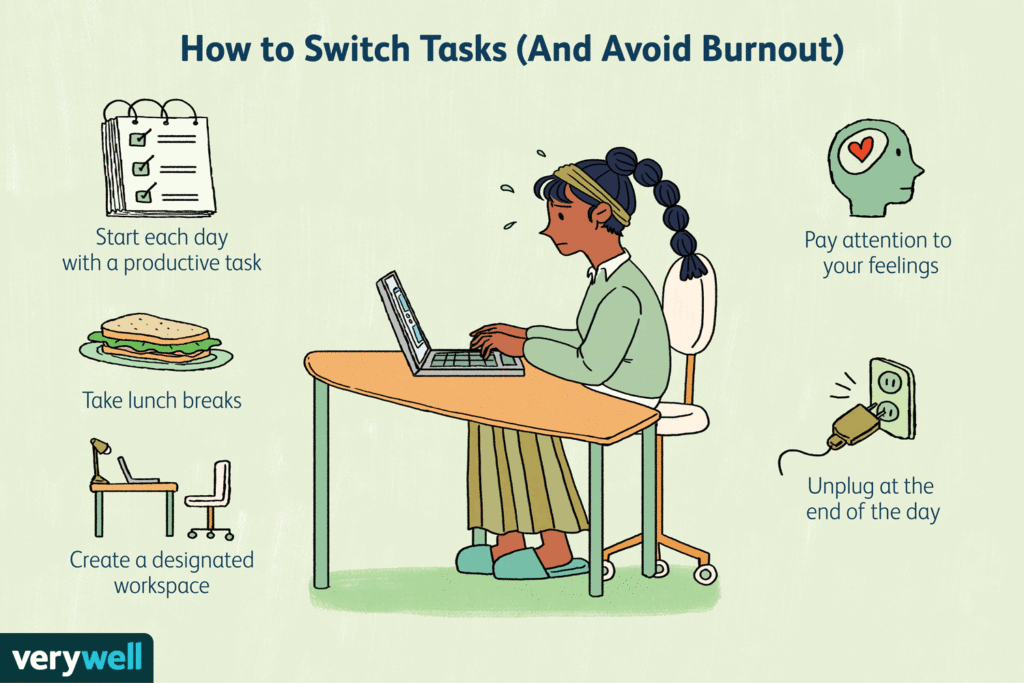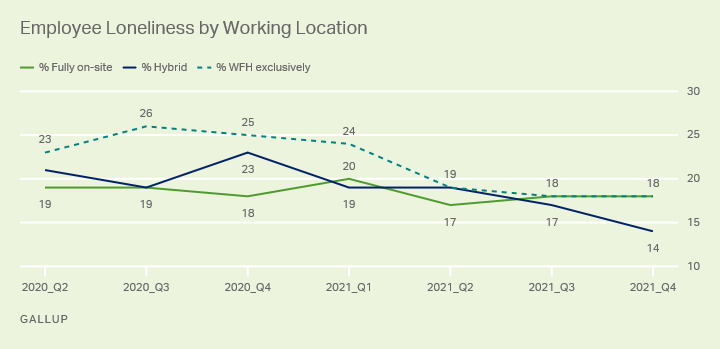Are You Ready for the Challenges of Remote Work? What You Need to Know Before Making the Switch

Choosing to work remotely is a big one. It can be an amazing experience, or it can be a total disaster (and, we don’t want that.) Before making the switch, it’s important to be aware of the most common remote work struggles and challenges.
In this blog post, we will discuss the most common remote work challenges and how to overcome them, therefore, if you’re considering making the switch to remote work, this guide is for you. Stay with us and read on!

Nowadays, it seems that if you are not jumping to remote work you are being left behind. However, remote work isn’t always the perfect situation. Remote workers face a different set of challenges than their office-bound colleagues. After all, remote work wasn’t the mainstream!
Back in April, the Ladders Q1 2022 Quarterly Remote Work report conveyed there was a sudden increase in remote jobs, which could be a sign of a permanent change in the way Americans work. Not even the most optimistic projections could have predicted the rate at which remote jobs grew in the first 2022 quarter!
You can see the amazing growth down below:

Does this mean everyone can be a remote worker or manage a remote company? Well, not at all. This is not some sort of work magic as becoming a remote worker or manager is a process of learning, re-learning, and keeping yourself motivated.
The key to remote working is having a remote mindset and being prepared for the most common remote work challenges!
While remote work has many benefits, it also comes with its own sets of unique problems that can sometimes be difficult to navigate. Here are some of the biggest remote work struggles remote workers have shared:
The Most Common Struggles of Remote Work: What You Need to Know Before Making the Switch
According to the State of Remote Work 2021 of Buffer, the most common struggles people face while working remotely are the following:

Difficulty to Unplug
As technological advances make it easier to connect with colleagues and clients from anywhere in the world, the danger of never stopping working is always there, looming. For many people, the line between work and home life begins to blur, making it difficult to relax or enjoy leisure time.
This struggle has become such an issue that the “right to disconnect from work” is already listed as a proposed human right regarding the ability of people to disconnect from work and not engage in electronic communications related to their job during non-work hours.

This law becomes handy when remote bosses want you to be “always on” or for you to stop feeling guilty when you finished your assigned tasks earlier than expected. Yet, you can avoid falling into the rabbit’s hole of workaholism with these tips:
- First, establish clear boundaries between work and personal time. Make sure to set aside specific hours for each, and stick to them as much as possible.
- Second, create a designated workspace in your home that is separate from the rest of your living space. This will help you to mentally transition into “work mode” when you sit down at your desk and make it easier to leave work behind when the workday is over.
- Finally, take advantage of technology that can help you to disconnect from work when you need to. For example, there are now apps that can block access to work-related websites or notifications during certain hours of the day.

By taking steps like these, you can make sure that working remotely doesn’t mean being “on” all the time!
Problems When Working With Teams
This is one of the most common challenges when working remotely as the lack of face-to-face interaction can make communication and collaboration challenging. Additionally, team dynamics can be harder to manage when team members are not in the same physical space.
Face-to-face interaction is usually more effective than written or audio-only because we can better understand each other when we see physical reactions like facial expressions and body language
The Washington Post calls it “the Science of Being There” and according to Mahdi Roghanizad and Vanessa Bonhs of the Western University, face-to-face requests are 34 times more effective than those sent by email, and a physical handshake promotes cooperation and influences negotiation outcomes for the better.

However, what happens when you work or manage a full remote setting? We know collaboration while remote can be hard due to time zone differences, language barriers, technical problems, or simple miscommunication! Read our tips below:
- Regular communication is essential. This can be done through video conferencing, phone calls, or even just messaging back and forth.
- Second, it is important to be clear and concise when communicating. This will help to avoid miscommunications and frustration.
- To stay connected, remote workers should consider setting up regular video calls or virtual meetings to interact with their teams face-to-face, if possible. Chatrooms are also great ways for remote workers to connect with colleagues without having to leave their desks.
- Making sure that remote employees are included in all company events, such as virtual happy hours or game nights over video chat. These activities can help remote workers feel connected to their remote team and organization, as well as provide a much-needed morale boost.
- Finally, it is helpful to build relationships with team members. Get to know them on a personal level so that you can work together more effectively.
Loneliness
Loneliness is a common feeling, but it can be amplified when working remotely. When you’re not around other people on a regular basis, it’s easy to start feeling isolated and disconnected. Especially with COVID-19 lockdown!
As you can see in the graph below provided by a Gallup survey, around the second quarter of 2021, workers felt less isolated, which got a correlation with the availability of vaccines. People started to feel less lonely as they started to physically interact.

Nevertheless, this doesn’t mean the issue is fully solved. This Gallup survey encourages organizations to nurture and foster workplace bonds and friendships.
According to Gallup, creating friendships with co-workers is linked with increased profits and better customer service
Fortunately, there are a few things you can do as an employee or a boss to foster these fellowships:
- Stay connected with your co-workers by scheduling regular video chats or phone calls. Get involved in group projects or discuss work-related topics outside of meetings.
- Encourage peer respect as part of your work culture.
- Set up virtual social and recreational activities. Even if you can’t physically be together, there are still ways to connect with co-workers and peers.
- Offer tools and resources that help remote workers with the organization. Make sure everyone has access to the same technology and resources to be successful in their remote positions.
- Be mindful of everyone’s time zones. Use a combination of synchronous (real-time) and asynchronous (not real-time) communication, such as using video conferencing for team bonding.
Distractions at Home
Distractions at home can be a big challenge when working remotely. Many things can interfere with focus and concentration, from the TV to family members, to even online shopping.

- One way to overcome this challenge is to create a dedicated workspace. This can be a room where you can close the door and be free from distractions. Alternatively, you can set up a makeshift office in a quiet corner of your home.
It’s essential to have a space where you can focus on your work without being interrupted
- Another way to overcome distractions at home is to plan your day. Make a list of what you need to accomplish and block out time for each task. This will help you stay on track and avoid getting sidetracked by unimportant tasks.
- Finally, remember to take breaks throughout the day. Get up and move around or step outside for some fresh air. These mini-breaks will help refresh your mind and body and allow you to return to your work with renewed focus.
Staying Motivated
As there is no one around you to keep tabs on your progress, remote workers must be self-disciplined and motivated to stay productive. This sounds easy enough, right? But, what’s the secret of motivation?
Some say that staying motivated is crucial to set realistic but challenging goals. However, for most crossing out items from the to-do list is just as rewarding. Our tip?
- Figure out what you need to do and make sure it’s something that will be satisfying when achieved.
- Use the SMART goal-setting framework. This stands for Specific, Measurable, Achievable, Relevant, and Timely. When setting a goal, make sure it meets these criteria.
- Try to break down your projects into manageable tasks. This will help make the process more achievable and light.
- Don’t forget the power of music! Listen to this playlist specifically titled: Classical Music for When You’re on a Deadline.
Being in Different Time Zones than Work Colleagues
If you are the only one in a different time zone than your work colleagues, you may feel like you’re always playing catch-up or that you’re not able to participate in important meetings. If you are a remote boss or manager, please don’t overestimate or minimize this feeling!
A remote worker feeling this way is a potential quitter or just an underwhelming performer. Take note that if you hired employees knowing the difference in time zones, you must take responsibility for them to feel and be included. How?
- Manage your work schedule in a way that accommodates both time zones:
To do this, plan important meetings and events during times when everyone is awake and available. This may mean having to adjust the start times of certain tasks or assignments.
- Also look into using online collaboration tools like video conferencing for real-time meetings, chats, and file sharing:
These tools allow everyone to stay connected regardless of their location or time zone.
- Finally, be respectful of different cultures and countries that have different holidays or work days:
Establish clear guidelines for when it’s okay to take a vacation and how other team members can cover any responsibilities during their absence. This will help ensure that everyone is on the same page, regardless of their location or time zone.
Time Management Skills
The last point of the graph doesn’t specify the challenge, so we took the liberty to choose our own: time management. Hard, isn’t it? Yet, this is the most basic and vital way to ensure that you can stay on top of your work while working remotely is to develop good time management skills.
Time management is the ability to plan, prioritize and execute tasks in an effective and efficient manner
Here are some tips for improving your time management skills:
- Create a schedule and stick to it – Set aside specific times for work, break, and leisure activities to make sure all your tasks are completed.
- Break it down – If a task seems overwhelming, break it down into smaller chunks that are easier to manage.
- Set time limits – Set time limits for each task so you stay on track and don’t get sidetracked by unimportant tasks.
- Set deadlines – Give yourself a deadline for each task to help motivate you and keep you on track.
- Prioritize tasks – To maximize your productivity, prioritize the most important tasks first, then work down the list from there.
- Take regular breaks – Taking regular breaks throughout the day can help your mind stay fresh and focused.
We recommend getting a subscription on Monitask, Trello, or Asana, which are management software to help you stay organized and in sync with your remote work and team!
Working remotely can have its unique challenges but also provides a lot of opportunities and flexibility. With proper planning and organization, anyone can make remote work successful.
Final Considerations
Working remotely is a fantastic opportunity for many, but it does require a certain level of discipline and determination. Doing your best to make sure that you stay connected with colleagues, stay productive and organized, and keep good time management skills will help ensure that remote work is successful for you in the long run.
Remember: no matter where you are, you’re part of an amazing team. So be sure to stay connected, engaged, and productive!
Of course, there may be moments when a remote worker will feel left out and that they are not part of the team. Make sure to reach out to them often and remind them that their value is still appreciated. At Monitask, we value teamwork and healthy remote work culture. If you want to learn more, visit our blog post archive!
-The Monitask Team


